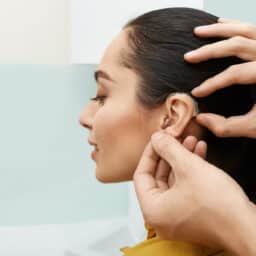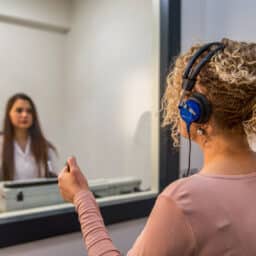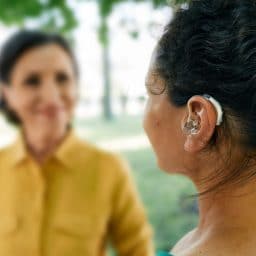How Untreated Hearing Loss Can Affect Your Mood
If you have untreated hearing loss and you’re also having problems with your mood, the two conditions may be linked. In this post, we review the connection and how you can improve both your hearing and boost your mood. What Does the Research Show? One 2022 study published in the journal Frontiers of Aging Neuroscience…
Benefits of a Hearing Test

According to a study published in the journal Hearing Technology Assessment, “A simple systematic screen, using an audiometric screening instrument, is acceptable to people in the age range 55-74 years, is likely to provide substantial benefit and may be cost-effective to those in that target group.” Besides being cost-effective, there are many benefits to getting…
How to Get the Most Out of Your Hearing Aids This Year

The National Institute on Deafness and Other Communication Disorders reports that, “Among adults aged 70 and older with hearing loss who could benefit from hearing aids, fewer than one in three (30 percent) has ever used them. Even fewer adults aged 20 to 69 (approximately 16 percent) who could benefit from wearing hearing aids have…
Reasons To Make a Hearing Test Your New Year’s Resolution

It’s hard to believe that another year is coming to a close. As you prepare to look ahead to 2023, you’re probably thinking about the goals you want to achieve and experiences you hope to enjoy. If you have hearing loss, having a hearing test and seeking treatment can help ensure you make the most…
How Often Should I Get My Hearing Tested?

Most people make regular checkups a part of their medical care. Annual physicals, dental exams and vision tests are all commonplace. Fewer individuals pay as much attention to their hearing, however. How often you get your hearing tested depends on your age. Newborn hearing screenings are essential, of course, and regular checkups throughout childhood are…
Don’t Let Hearing Loss Prevent You From Dining Out

Individuals with hearing loss have difficulty communicating in environments with excessive background noise, such as busy restaurants. Rather than face the prospect of trying to enjoy a good meal while dealing with competing conversations, clanging silverware and dishes and distracting music, many choose to skip the experience altogether. But you don’t have to consign yourself…
How To Prepare for Your First Audiologist Visit

If you’ve been having problems hearing and have scheduled an appointment with an audiologist, know that you are taking an important step in prioritizing your health and wellbeing! However, even though you’re making a great decision, that doesn’t mean that you won’t feel nervous or overwhelmed as your appointment approaches. Let’s go over a few…
Benefits of Treating Your Hearing Loss Early

Paying your taxes late results in a penalty, and leaving your planning to the day before the party causes unnecessary stress, so why do so many people put off seeking help for medical issues when it will almost certainly make things worse? One of the most common conditions residents in the Bay Area avoid dealing…
Hearing Devices & Neuroplasticity
The brain has a remarkable ability to adapt to change. Learning and experiences can transform the physical structure of the brain, and the brain can move functions from one area to another if one section of the brain is damaged or understimulated. This ability to adapt is referred to as neuroplasticity. It comes into play…
Good Boy! How Hearing Dogs Create Happier Lives
Aptly nicknamed ‘man’s best friend,’ some canine companions can provide more than just comfort. Hearing dogs serve as a second set of ears for people with severe hearing loss or deafness. Why They’re Doggone Amazing Hearing dogs are trained to alert their masters to sounds in the home by nudging or pawing their owners to…
